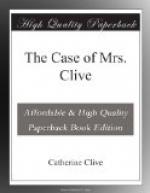Mrs. Clive admits, however, that reduced, unpaid, or “handled” salaries were not the first fear of the actors; it was instead, she says, the fear of what “would happen from an Agreement supposed to be concluded betwixt the two Managers, which made ’em apprehend, that if they submitted to act under such Agreements, they must be absolutely in the Managers Power.” As the writer of The Case Between the Managers (p. 11) presents it, a conversation between a personified Covent Garden and Drury Lane would have gone like this: “Well, but, Brother Drury, we can manage that matter [how to keep audiences]—Suppose you and I make a Cartel; for instance, agree for every other Theatre, and oblige ourselves by this Cartel to reduce by near one half the Salaries of our principal Performers—I’gad, we may cramp ’em rarely this way—they must serve us at any rate we tax their Merit at, for they’ll then have no where else to go to.” Drury Lane responds, “D—n me, if that is not divinely thought—my dear Friend, give me a Kiss.”
Late in the summer of 1743, several months before the salary figures described above, Garrick, Macklin, Clive, and Mrs. Pritchard among the principal players attempted to obtain another license to set up their own company in the Haymarket: shades of 1733. They applied to the Chamberlain Grafton—who denied it, in part perhaps because put out that Garrick commanded over L500 a year. There was no chance, therefore, to sidestep the monopoly effected by the licensing act. Leading the secession, Garrick agreed with his colleagues to stay out until redress was forthcoming. Redress did not come, the defectors lost, Fleetwood won. He starved them in not out, Garrick was persuaded to return to Drury Lane (which he does in early December, 1743) by the entreaties of several of the destitute seceded players who asked him to accede to Fleetwood’s terms. As Garrick explains to Macklin (see note 2), he did so because he had the economic welfare of his fellow actors at heart. Macklin infuriated with him and Clive disappointed in him, both refused to accept Garrick’s decision, and hence became renegade. Macklin, uninvited back by Fleetwood, admired Olive’s decision to have no part in signing a petition presented to her by her fellow defectors who understood that the refusal of a separate license dissolved their bond. Macklin writes in his Reply to Mr. Garrick’s Answer (p. 27) that “it ought to be known that when this Letter was carried to Mrs. Clive, and her Name to it desired, she had the Honour and Spirit to refuse, upon any Consideration, to be made so ridiculous a Tool to so base a Purpose.”




